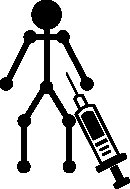Alopecia Areata Treatment London
Alopecia areata is a form of hair loss that often affects the scalp and/or the beard, although eyebrows and eyelashes can also be involved. It is typically triggered by stress. However, there may be a strong family history and there is a strong association with other conditions including psoriasis, vitiligo, inflammatory bowel disease and thyroid disease. Low vitamin D levels have also been strongly linked to alopecia areata.
What is Alopecia Areata?
Alopecia areata is an autoimmune condition. An autoimmune condition is where the body attacks itself. In the case of Alopecia Areata, it results in isolated patches of hair loss mainly affecting the scalp and beard with skin appearing very shiny. If allowed to persist these patches can become chronic and the risk of developing alopecia totalis (complete hair loss of the scalp) or universalis (loss of all body hair) increases. Alopecia areata is caused by collapse of the immune ‘privilege’ of the lower third of the hair follicle. This means the body starts to recognise this portion of the hair follicle as foreign and is attacked by the immune system resulting in loss of hair. In the absence of scarring there is the potential for hair to grow back. Returning hair can be ‘white’ initially and the presence of regrowth hair is often a good sign of potentially complete recovery. Generally the younger the patients are at the start of the condition the poorer the outcome. More widespread alopecia areata is less likely to recover. In general the extent of recovery for alopecia areata can be very difficult to predict.

Is hair loss in Alopecia Areata permanent?
Alopecia Areata is an autoimmune condition. As a result spontaneous remission is possible and in seen in almost 80% of patches within 1 year of appearing. On a first visit to the GP many patients are often reassured and advised to wait for the patches to recover with limited recourse to treatment. However, if patches of alopecia areata are left untreated there is an increasing risk of progression to chronic alopecia areata (patches lasting more than a year), alopecia totalis (complete loss of hair on the scalp) and even alopecia universalis (complete loss of hair on the body).
A recent study found that a solitary stable patch of alopecia areata present for less than 6 months has a 13% risk of developing into chronic alopecia areata and a 6% risk of developing into alopecia totalis or universalis. Where a patch is present for more than 6 months but less than 1 year this risk increases to 65% and 30% respectively. A patch lasting more than 1 year is defined as chronic alopecia areata and has a risk of progressing to alopecia totalis or universalis is 45%.
At Rejuvence Clinic we believe it is essential treatment for alopecia areata is started as soon as possible. The longer a patch is present, generally the more difficult it can be treat. Likelihood of complete recovery decreases with time.
Can I get treatment on the NHS?
On discovering a patch of hair loss in the scalp, beard or eyebrow, most patients arrange to see their GP. Your GP will examine the patch and is likely to confirm the diagnosis of Alopecia Areata. They may arrange for some blood tests to check for certain related conditions including thyroid function, kidney function, liver function and vitamin D levels. Initial treatment with topical steroids maybe started. Referral criteria to a dermatologist are strict and many primary care trusts will insist on a trial of topical steroids prior to making any referral. Wait times to see a dermatologist can be at least 3 months with many having to wait more than a year. In this time it is quite possible the patches can expand and the risk of developing chronic alopecia areata, alopecia totalis or universalis increases.
At Rejuvence Clinic we provide those with alopecia areata an alternative source of expertise and treatment. We are able to assess, diagnose and start necessary treatment immediately.
Intralesional Steroid Injections are first line for Alopecia Areata
There are different treatment options available for alopecia areata but no treatment is guaranteed to cure the condition. Unfortunately it can come back. Topical steroid creams and injection of steroid into patches of hairless skin (intralesional) have been shown to yield positive results. This is recommended as FIRST LINE treatment for Alopecia Areata.
Suggested treatment courses should be a single round of steroid injections every 4 to 6 weeks. These injections usually need to be repeated with results potentially appearing after 1 -2 months. At Rejuvence Clinic we have treated a number of individuals with steroid injections in hairless patches with good success. For further details please contact us for a consultation.
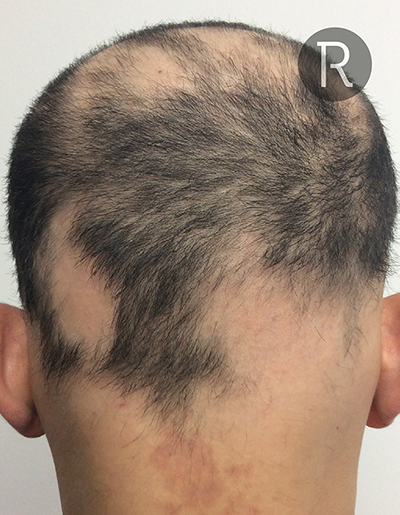
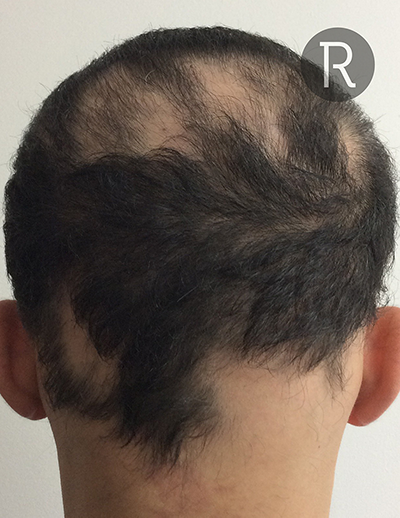
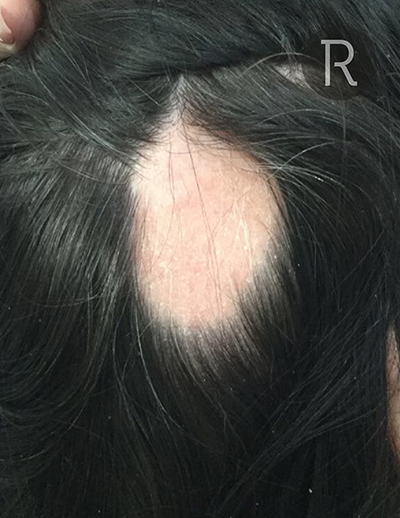
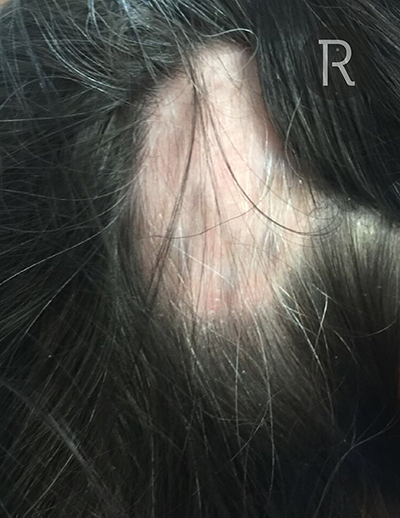
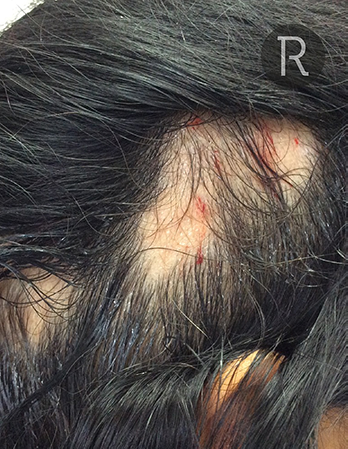
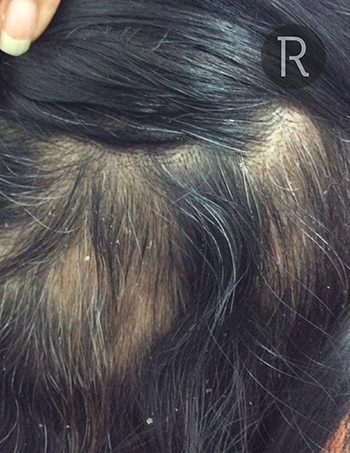
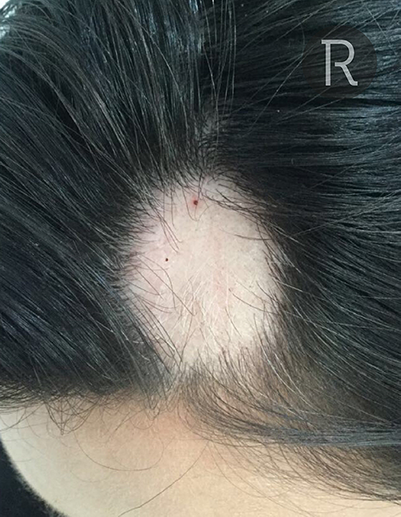
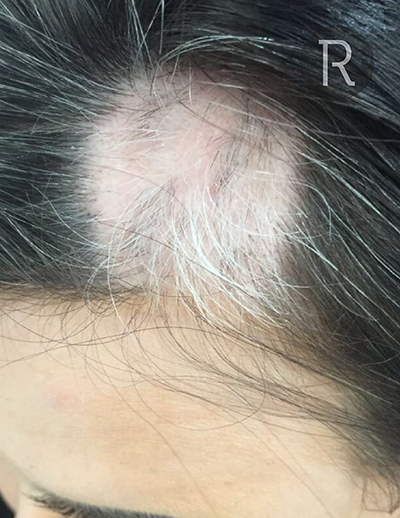
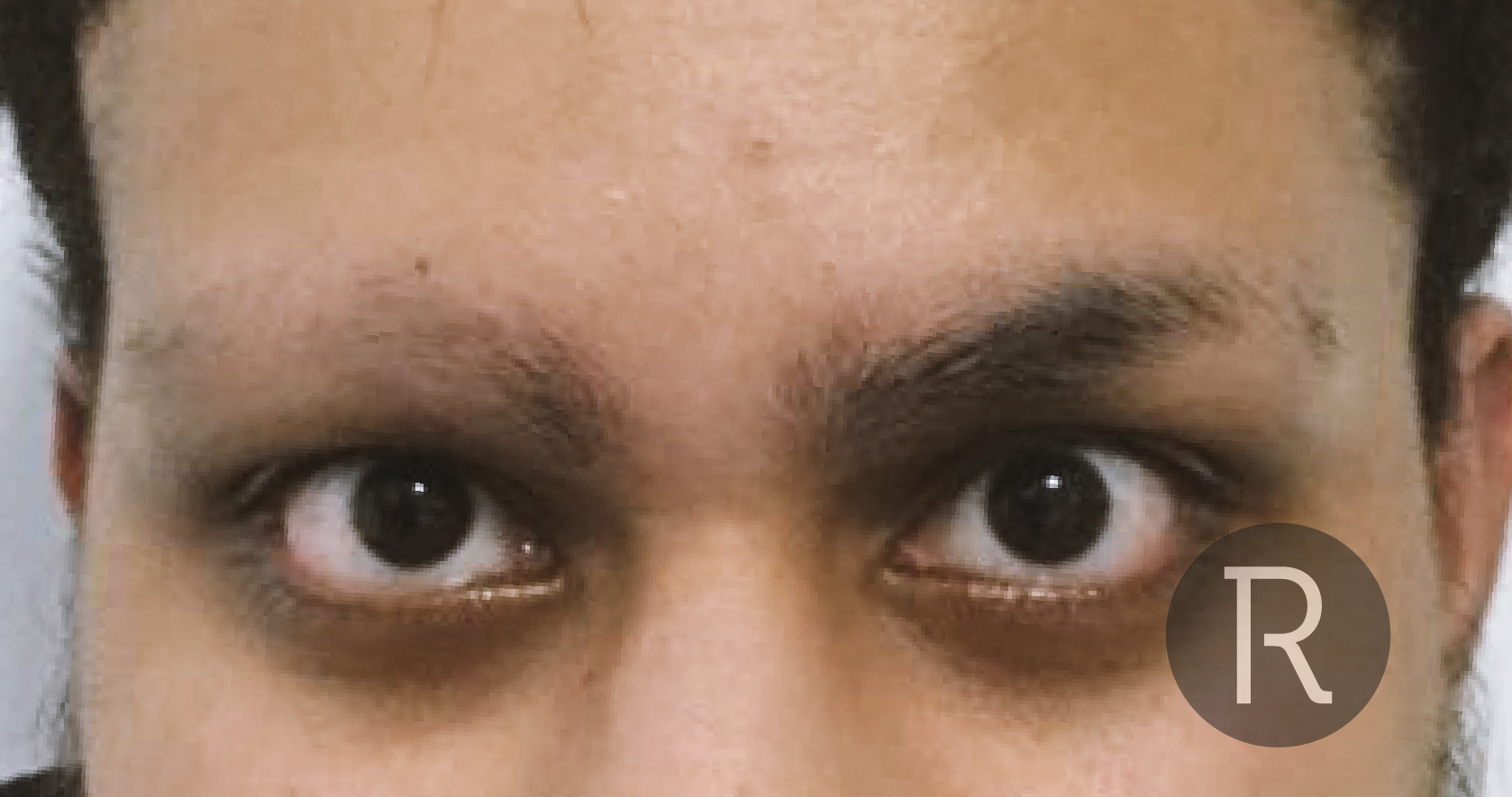
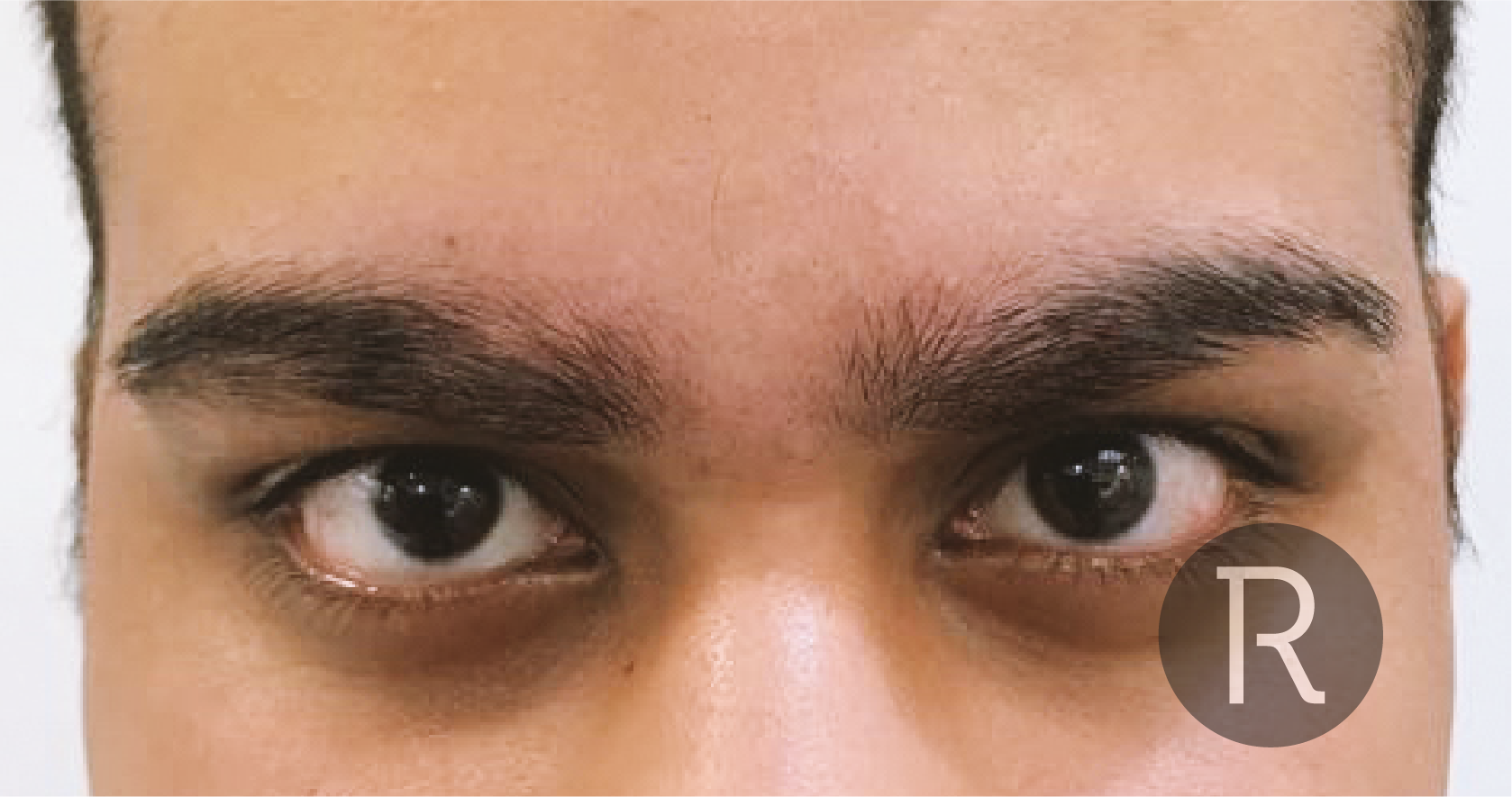
©Individual results may vary.
What about treatment for eyebrows and eyelashes?
Alopecia Areata can also affect eyebrows and eyelashes. Sufferers can present with one or both sides being affected and even develop complete loss of eyebrow on one or both sides. Treatment is similar to that of the scalp. Intralesional steroid injections can be very effective. In the case of eyelashes intralesional injections are not option. In the case of multiple patches of alopecia areata that includes eyelashes, steroid pulse treatment can be helpful. This involves the use of oral steroids over a period of 3-4 months. It has also been found that topical application of glaucoma eyedrops can help with eyelash growth.
Minoxidil is FDA approved for androgenic alopecia and the main constituent of Regaine™. However, topical Minoxidil also has a role to play for alopecia areata, especially if steroid treatment is slow to work. Minoxidil can help to reduce disease activity as well encourage growth of hairs in the patches of alopecia areata.
A combination of microneedling and growth factor therapy treatment has been gaining popularity in the treatment of hair loss. Microneedling is considered a collagen induction treatment that can result in follicular stimulation and hair regrowth. Growth factor therapy stimulates fibroblasts that can initiate hair regrowth. It also has an anti-inflammatory effect that can help to counter alopecia areata. Reported effects in alopecia areata are encouraging for patients who do not respond to steroid treatment. It is also an excellent adjunct for those suffering with wide spread alopecia areata if we are being mindful of the dosing and extent of intralesional steroid use. At Rejuvence we are Regenerative Medicine Specialists. We offer the Magellan System™ from Arteriocyte as well as Angel Arthrex™. Furthermore we can combine growth factor therapy treatment sessions with intralesional steroid injections to optimise impact. For further details call us on 02075316600 and book a consultation with one of our doctors.
Caffeine containing shampoos claim to have hair growing potential. A study published in the British Journal of Dermatology, in 2014, demonstrated growth promoting effects of caffeine on human hair in both males and females. There was a suggestion that caffeine maybe more effective in male and female pattern hair loss rather than alopecia areata.
There are thousands of over the counter supplements that are available for hair loss. They all claim to improve hair loss, whether it be Alopecia Areata or pattern hair loss. There are no published studies highlighting any particular type of supplement. However, there is no doubt that the correct choice of supplements can help. It is important to realise that the causes of Alopecia Areata are multiple and they may be working together to make the condition worse. As mentioned above, low Vitamin D levels, an underactive thyroid and low iron levels can all contribute to hair loss.
At Rejuvence Clinic we offer Replenology™ Hair Supplements. This is a unique hair supplement that is only available at Rejuvence. Replenology has been developed and manufactured in Canada. It is a vegan friendly product with a mix of vitamins and minerals along with some homeopathic and ayurvedic input. Replenology has been the subject of a number of clinical trials and in direct comparison to a variety of established hair loss treatments for men and women. Replenology faired well demonstrating significant improvements in hair density and calibre over a follow up period of 6 months. Although the majority of trials have been carried out in male and female pattern hair loss patients anecdoctal evidence and testimony from the company and users suggest that it is helpful in alopecia areata as well.
At Rejuvence we offer intravenous vitamin drips tailored to specific needs. Our Hair Boost Drip consists of a combination of vitamins and biotin and can help improve the quality of your existing hair as well as improve hair loss. In alopecia areata it can be a supplemental treatment but should only be taken alongside conventional treatments such as steroid injections.
In some cases intralesional steroid injections are not as effective. This usually occurs in cases where a patch of alopecia areata has persisted for more than 1 year without any treatment. Also in situations where there are multiple patches of alopecia areata amounting to more than 20% of the scalp, treatment with intralesional steroids alone can be less fruitful. In these situations steroid pulse treatment regimes can be considered. Steroid pulse treatment consists of taking oral steroid tablets as per specific protocols for a period of a 3-4 months. This has been shown to help improve alopecia areata especially when combined with intralesional injections. At Rejuvence Clinic we can consider the use of oral steroids in more severe cases of alopecia areata where more than 20% of the scalp is involved.
At Rejuvence Clinic we are able to carry out a scalp biopsy. A scalp biopsy can help to confirm a biopsy of Alopecia Areata. Often a clinical examination is sufficient. However, in certain cases it can be difficult to confirm this diagnosis and differentiate between alopecia areata and other conditions such as CCCA – Central Centrifugal Cicatricial Alopecia. Treatment options for this condition are slightly different with a combination of intralesional steroid injections, certain types of antibiotics and even immunosuppressant medication.
Hair Transplants CANNOT be performed for patients suffering with long term and widespread alopecia areata. Grafts implanted into the affected areas will not grow and the transplant is likely to be a failure. We strongly advise all our patients suffering with widespread alopecia areata not pursue a hair transplant.
What are JAK inhibitors?
Alopecia Areata is an autoimmune condition. This means the body recognises it’s own hair follicles as foreign and begins to attack them. The lower third of the hair follicles are defined as having immune ‘privileges’ and not subject to attack from the body’s own immune system. In alopecia areata hair follicles lose this ‘privilege’ due to gamma interferons (specific signalling protein molecules) activating the ‘Janus-Kinase’ pathway. Studies published in the last few years have identified a specific group of medication known as JAK-inhibitors. This group of medication has been found to significantly improve alopecia areata especially in cases of chronic patches and where there is more than 20-40% scalp involvement and intralesional steroid injections and steroid pulse regimes have been unsuccessful.
JAK inhibitors are considered to be disease modifying drugs and used to treat a host of inflammatory conditions including rheumatoid arthritis, psoriatic arthritis, ulcerative colitis and atopic dermatitis. In lower doses they have been shown to be effective in alopecia areata. However, they are also associated with a host of risks and side effects. These include increased susceptibility to infection, deranged liver function, increased cholesterol, and increased risk of strokes and heart attacks especially in those above the age of 65 and with a history of smoking and atherosclerotic disease. They are available on the NHS but are currently only prescribed for alopecia areata in the presence of another inflammatory/rheumatoid condition such as rheumatoid arthritis. They are also extremely expensive at present with a 28 tablet box costing in excess of £1000. JAK inhibitors will no doubt feature strongly in the future for the treatment for alopecia areata but as of yet are not an affordable option for most.
REPLENOLOGY Hair - Replenishment & Nourishment
REPLENOLOGY Hair is a four part natural system formulated for use by both women and men to fully replenish nutrients that are lacking when experiencing hair loss and that are necessary for healthy hair. These nutrients target 21 causes of hair loss and support normal scalp & intrinsic hair functions along with providing cosmetic benefit to protect and improve the look of healthy and fuller hair. The Replenology Hair Daily Dietary Supplement can be combined with Replenology Daily Shampoo and Daily Conditioner. In addition the Daily Advanced Follicle Nutriment is a topical product that can be applied to specific patches of hair loss such as those that can occur in Alopecia Areata.
Replenology Hair works by replenishing nutrients in the hair follicles that have been depleted due to ageing, diet, hormonal changes, environmental effects, certain medication and long term exposure to chemical ingredients in some hair products.
What are the benefits of Replenology?
Replenology Hair has been formulated to target 21 known causes of hair loss and shown to replenish nutrients in the hair follicles that are not normally found in a regular diet and hair care products, including natural stilbenes, wedelolactones, procyanidins. Replenology Hair is not a drug with associated potential side effects.
When will I see results? Replenology Hair begins working for you on the 1st day of use and you may see results as early as 4 to 8 weeks after commencing daily use. However, it may take 4 to 6 months to notice an effect. This will depend on how depleted the nutrients are in each individual and other overall health factors. You may notice a reduction in hair fall within 4 to 8 weeks followed by fuller and healthier looking hair on the scalp within 4 to 6 months. Once you begin using the Replenology Hair four part system you may experience an improvement in your wellbeing and energy levels due to the multiple vitamins, minerals and botanicals, that are rich in nutrients, amino acids and antioxidants, found in each of the Replenology Hair products. An improvement in the overall condition of your scalp and hair may also be experienced due to the nourishment that Replenology Hair will provide for you. The gentle but powerful ingredients will also protect your hair against the effects of everyday pollution and ultraviolet exposure.
Does Replenology actually work?
Replenology is a novel botanical natural product treatment for male and female pattern hair loss. A recent multi-author study (systematic review and Bayesian network meta-analysis) comparing improvements in hair growth across the main non-surgical hair loss treatments for male and female pattern hair loss including FDA approved medication, Low Level Laser Therapy (LLLT) and Viviscal™. Replenology supplements demonstrated a statistically significant increase in terminal hair density in men and women that was greater than that observed for other treatment modalities included in the study. Women were found to have an accelerating terminal hair regrowth rate between 3 months and 6 months. Men had a continuous regrowth rate. Replenology did not demonstrate any signs of resistance whereas resistance was evident in all other treatment regimens. The study concluded that a multi-targeting treatment approach is required and that Replenology combined with other treatment regimes such as Magellan or Angel Arthrex shows potential promise. However, statistical evidence of a superior response with Replenology compared to other more established non-surgical hair loss treatments does not mean it should completely replace FDA approved treatment options.
At Rejuvence Clinic we stock Replenology products and specifically sell the Professional Grade Supplement. For further details on the Replenology product line and whether it could benefit you in your battle against hair loss call us on 0207 531 6600 or WhatsApp us.













